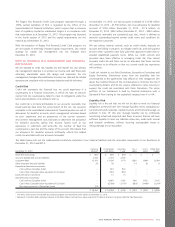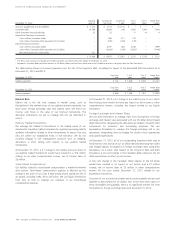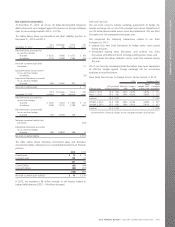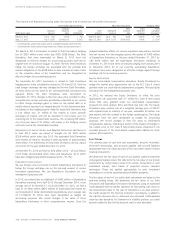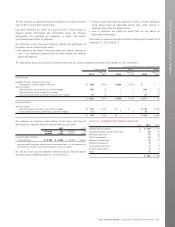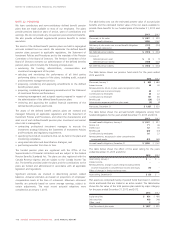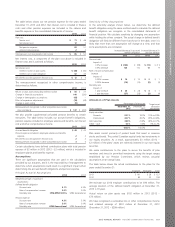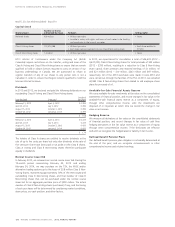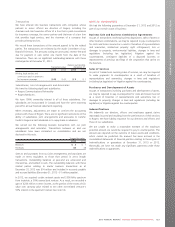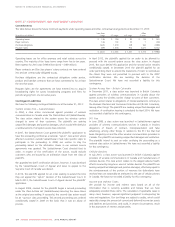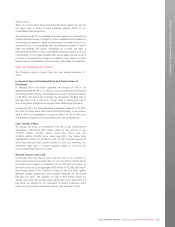Rogers 2013 Annual Report Download - page 126
Download and view the complete annual report
Please find page 126 of the 2013 Rogers annual report below. You can navigate through the pages in the report by either clicking on the pages listed below, or by using the keyword search tool below to find specific information within the annual report.
NOTES TO CONSOLIDATED FINANCIAL STATEMENTS
Unrecognized stock-based compensation expense at December 31,
2013 related to stock-option plans was $11 million (2012 –
$11 million), and will be recorded in net income over the next four
years as the options vest.
Restricted Share Units
RSU Plan
The RSU plan allows employees, officers and directors to participate in
the growth and development of Rogers. Under the terms of the plan,
RSUs are issued to the participant and the units issued cliff vest over a
period of up to three years from the grant date.
On the vesting date, we will redeem all of the participants’ RSUs in cash
or by issuing one Class B Non-Voting share for each RSU. We have
reserved 4,000,000 Class B Non-Voting shares for issue under this plan.
We granted 871,988 RSUs in 2013 (2012 – 721,005).
Performance RSUs
We granted 232,220 performance-based RSUs in 2013 (2012 –
172,779) to certain key executives. The number of units that vest and
will be paid three years from the grant date will be within 50% to
150% of the initial number granted based upon the achievement of
certain annual and cumulative three-year non-market targets.
Summary of RSUs
The table below is a summary of the RSUs outstanding, including
performance RSUs.
2013 2012
Number of units
Outstanding, beginning of year 2,255,158 1,988,955
Granted 1,104,208 893,784
Exercised (681,652) (159,843)
Forfeited (205,324) (467,738)
Outstanding, end of year 2,472,390 2,255,158
Unrecognized stock-based compensation expense at December 31,
2013 related to these RSUs was $42 million (2012 – $37 million) and
will be recorded in net income over the next three years as the RSUs
vest.
Deferred Share Unit Plan
The DSU plan allows directors and certain key executives to elect to
receive certain types of compensation in DSUs, which are classified as a
liability on the consolidated statements of financial position.
We granted 103,990 DSUs in 2013 (2012 – 115,964). At December 31,
2013, 700,912 DSUs (2012 – 741,423) were outstanding.
Unrecognized stock-based compensation expense at December 31,
2013, related to these DSUs was $2 million (2012 – nil) and will be
recorded in net income over the next three years as the executive DSUs
vest. All other DSUs are fully vested.
Employee Share Accumulation Plan
Participation in the plan is voluntary. Employees can contribute up to
10% of their regular earnings through payroll deductions (up to an
annual maximum of $25,000). The plan administrator purchases our
Class B Non-Voting shares on a monthly basis on the open market on
behalf of the employee. At the end of each month, we make a
contribution of 25% to 50% of the employee’s contribution that
month, and the plan administrator uses this amount to purchase
additional shares on behalf of the employee. We record our
contributions made as a compensation expense.
Compensation expense related to the employee share accumulation
plan was $30 million in 2013 (2012 – $26 million), which we included
in employee salaries and benefits.
Hedging of Stock-Based Compensation
We entered into Equity Derivatives to hedge a portion of our stock-
based compensation expense in 2013 (see note 20) and recognized a
$8 million loss in stock-based compensation expense for these
derivatives.
Assumptions
Significant management estimates are used to determine the fair value
of stock options, RSUs and DSUs. The table below shows the weighted-
average fair value of stock options granted during the years ended
December 31, 2013 and 2012, and the principal assumptions used in
applying the Black-Scholes model for non performance-based options
and trinomial option pricing models for performance-based options to
determine their fair value at grant date:
2013 2012
Weighted average fair value $ 9.68 $ 7.51
Risk-free interest rate 1.2% 1.6%
Dividend yield 3.4% 4.0%
Volatility of Class B Non-Voting shares 26.2% 28.1%
Weighted average expected life n/a 5.4 years
Weighted average time to vest 2.4 years 2.4 years
Weighted average time to expiry 9.9 years 6.9 years
Employee exit rate 3.3% 3.9%
Suboptimal exercise factor 1.5 2.6
Lattice steps 50 50
Volatility has been estimated based on the actual trading statistics of
our Class B Non-Voting shares.
NOTE 25: RELATED PARTY TRANSACTIONS
Controlling Shareholder
Our ultimate controlling shareholder is the Rogers Control Trust (the
Trust) which holds voting control of Rogers. The beneficiaries of the
Trust are members of the Rogers family. Certain directors, senior
executives and corporate officers of Rogers represent the Rogers family.
We entered into certain transactions with the ultimate controlling
shareholder and private Rogers’ family holding companies controlled by
the Trust. These transactions, as summarized below, were recorded at
the amount agreed to by the related parties and are subject to the
terms and conditions of formal agreements approved by the Audit
Committee.
Transactions with Key Management Personnel
Key management personnel include the directors and our most senior
corporate officers who are primarily responsible for planning, directing
and controlling our business activities.
Compensation
The compensation expense for key management for employee services
was included in employee salaries and benefits as follows:
2013 2012
Salaries, pension and other short-term
employee benefits $11 $10
Stock-based compensation expense 27 35
$38 $45
122 ROGERS COMMUNICATIONS INC. 2013 ANNUAL REPORT



